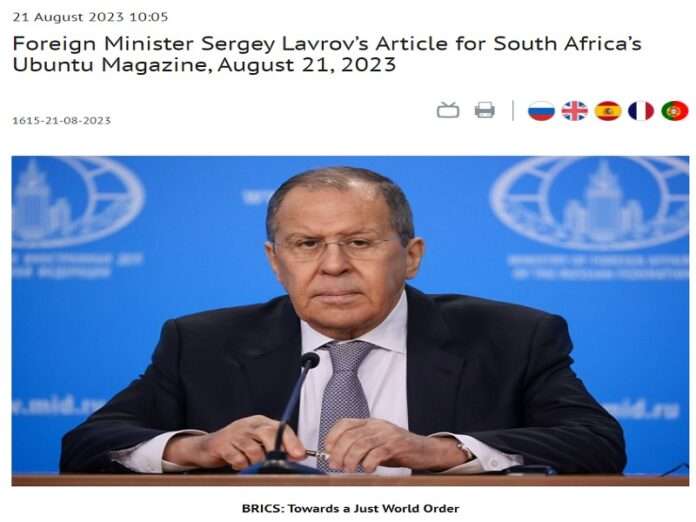Russian Foreign Minister Lavrov published an article in South Africa’s Ubuntu Magazine on the eve of the 15th BRICS Summit that’ll be hosted in that country. Titled “BRICS: Towards a Just World Order”, he explained how Russia envisages its global role and built upon the efforts earlier this month by Kremlin spokesman Dmitry Peskov to clarify false perceptions of BRICS. This includes the Alt-Media Community’s (AMC) most popular one imagining that it’s driven by de-dollarization and is resolutely anti-Western.
Lavrov began by describing the global systemic transition to multipolarity, particularly its economic-financial dimensions, so as to set the context within which this week’s BRICS Summit is taking place. Of pertinence, he mentioned that “not only Russia, but also a number of other countries are consistently reducing their dependence on the US dollar, switching to alternative payment systems and national currency settlements.”
The abovementioned trend isn’t de-dollarization like the AMC understands it to be in the sense of advancing a political decision aimed at phasing out the use of that currency in totality. Rather, it can more accurately be described as diversification from the dollar in order to hedge against forex and other risks posed by dependence on it. While they might appear identical to the average member of the AMC since both goals decrease the dollar’s share in the economy, their motivations are entirely different.
The first is a pipedream since it’s not realistic to phase the dollar out of global circulation anytime soon due to the size of the US economy, that country’s deeply entrenched influence over the financial system, and the dollar’s status as the global reserve currency. Furthermore, it’s a de facto declaration of financial warfare (albeit out of self-defense after the US weaponized the dollar for hegemonic purposes), which could prompt the US to viciously retaliate against any country that dares to openly pursue this goal.
As for the second, this is an apolitical and reasonable policy that wisely eschews any de facto declaration of financial warfare against the global reserve currency, thus lessening the odds that the US would overreact to this move. In fact, those strategists who finally realized that it’s impossible to preserve the Western-centric financial system might advise US and EU policymakers to support the Global South in implementing gradual reforms as part of their newfound policy for improving ties with those states.
The next part of Lavrov’s article that’s worthy of extra attention was when he described Russia as “a civilisation State, the largest Eurasian and Euro-Pacific power”. The first adjective refers to its new worldview that acknowledges the growing role of civilizations in International Relations, the second is a reaffirmation of its recent self-identity, while the third reminds everyone of its partial European identity. The last part is relevant with respect to France’s newly expressed interest in BRICS.
By reminding everyone of Russia’s partial European identity, Lavrov is implying that there’s no need to expand the group’s membership in that part of the world on the pretext of representing it. Extrapolating on this, Russia felt uncomfortable with publicly financed Chinese media endorsing France’s request to attend this year’s summit, which it made after Macron’s trip to Beijing this spring strengthened strategic ties. Lavrov is therefore signaling to China that Russia opposes BRICS having any formal ties with France.
The next part of his article concerned the need to support Africa’s greater involvement in global affairs through commensurate representation in international fora, which aligns with Russia’s policy towards the continent that readers can learn more about here, here, and here. Expanding BRICS’ ties with these states gives them more influence in shaping the emerging financial architecture that this group is building and correspondingly ensuring that it meets the interests of developing countries.
Lavrov crucially clarified that “We do not aim to replace existing multilateral mechanisms, much less to become a new ‘collective hegemon’. On the contrary, the BRICS countries have consistently advocated the creation of conditions for the development of all States, which excludes the bloc logic of the Cold War and zero-sum geopolitical games. BRICS seeks to offer inclusive solutions based on a participatory approach.” This is Russia’s most direct debunking of the AMC’s false perceptions about BRICS thus far.
By confirming that Russia doesn’t envisage BRICS “replac[ing] existing multilateral mechanisms” and that this group “excludes the bloc logic of the Cold War”, Lavrov is reassuring developing countries that they needn’t fear that their interest in expanding ties with it will be framed as “anti-Western”. The majority of the world doesn’t want to take sides in the New Cold War between the US-led West’s Golden Billion and the Sino–Russo Entente, instead preferring to remain neutral and balance between both like India does.
Therein lies the purpose of Lavrov’s piece, which was to dispel the disinformation circulating about BRICS from the AMC and their Mainstream Media rivals alike in order to raise the chances that as many developing countries as possible formalize some sort of relationship with the group this week. He could have gone along with misportraying BRICS as driven by de-dollarization and resolutely anti-Western, but that would have scared away most of the Global South, which would have served the US’ interests.







